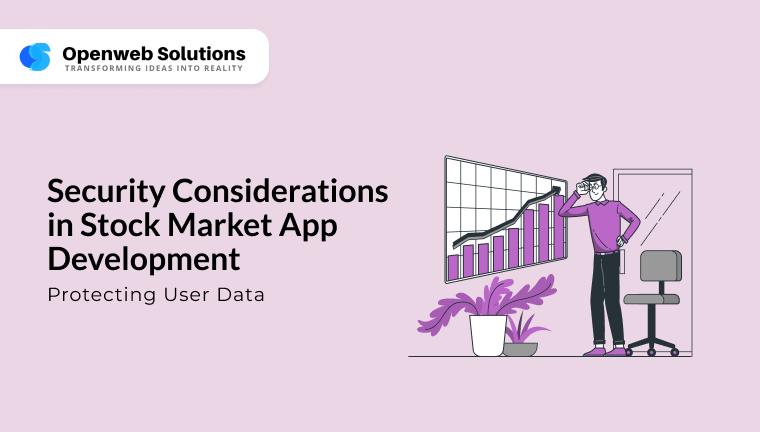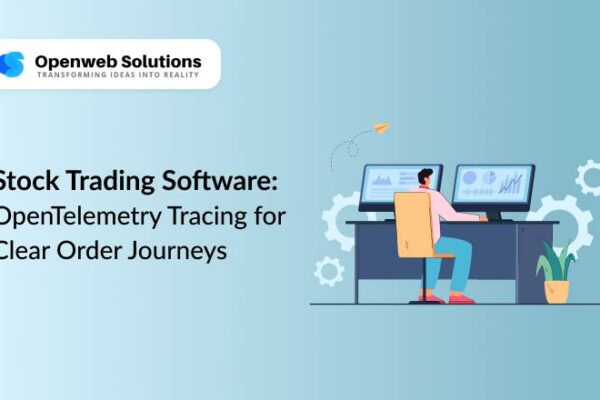Operating in the world of finance is both easy and difficult. It’s easy because you have mobile and web apps today that can conveniently help in money management. At the same, it’s difficult because unfortunate security incidents happen where traders’ financial details are exposed making them lose money. Do you know why it happens? Just because stock market apps are not equipped with security measures. So, what is the way out? Your stock market app development service provider must keep security elements. This blog’ll explore key security considerations to safeguard user information and maintain trust.
Important Security Considerations to Safeguard Information
1. Data Encryption
Due to the sensitive nature of financial data and transactions, all sensitive data, such as user credentials and financial transactions, are encrypted both at rest and in transit using protocols like SSL/TLS and AES. Stock Market Software Development companies implement robust encryption protocols to ensure that sensitive information, such as personal details and trading data, remains secure from unauthorized access. For example, using SSL/TLS encryption for data transmitted between the user’s device and the server protects against interception and tampering.
2. Authentication and Authorization
An expert Stock Market App Development Company ensures the implementation of robust authentication mechanisms. Multi-factor authentication (MFA) adds an additional layer of security by requiring users to provide multiple forms of verification before accessing their accounts. Additionally, proper authorization protocols should be in place to ensure that users only have access to the data and functionalities they are permitted to use. This reduces the likelihood of unauthorized entry and possible data security incidents.
3. Regular Security Audits
Conducting regular security audits is essential in stock market software development. These audits help identify vulnerabilities and weaknesses in the app’s security framework before they can be exploited. Engaging with cybersecurity experts to perform penetration testing and code reviews ensures that the app adheres to industry best practices and maintains a high standard of security.
4. Secure Development Practices
Incorporating secure development practices includes following secure coding guidelines, using up-to-date libraries and frameworks, and regularly patching any software vulnerabilities. Adopting a secure software development lifecycle (SDLC) approach helps in embedding security throughout the development process, from planning to deployment.
5. Data Privacy Regulations
Compliance with data privacy regulations is a critical consideration in stock market website development. Regulations like GDPR (General Data Protection Regulation) and CCPA (California Consumer Privacy Act) enforce stringent rules for managing user data. Ensuring that your stock market app complies with these regulations not only helps in avoiding legal penalties but also builds trust with users by demonstrating a commitment to their privacy.
7. User Education
Educating users about best practices for securing their accounts can significantly enhance the overall security of stock market apps. It’s a necessity for any stock market app development company to integrate educational tools and resources in stock trading apps. These tools will teach your app users how to protect their data.
Final Thoughts
A trusted Stock Market App Development service provider must prioritize key security considerations such as data encryption, robust authentication mechanisms, regular security audits, secure development practices, and compliance with data privacy regulations. Additionally, educating users on how to safeguard their accounts can further enhance the app’s security posture. By integrating these measures, you can build a secure, trustworthy platform that not only protects users but also upholds your reputation in the competitive world of finance.
Let’s study some interesting FAQ’s
FAQ 1. Why is data encryption crucial in stock market apps?
Data encryption is essential because it ensures that sensitive financial data, such as user credentials and transaction details, is protected from unauthorized access. Encryption protocols like SSL/TLS and AES are used to safeguard data both in transit (as it’s transferred between devices) and at rest (when stored on servers). This helps prevent data breaches and secure the personal and financial information of users.
FAQ 2. What role does Multi-Factor Authentication (MFA) play in enhancing security?
Multi-Factor Authentication (MFA) provides an additional layer of security by requiring users to verify their identity through multiple methods, such as a password and a one-time code sent to their phone. This significantly reduces the risk of unauthorized access, even if a user’s password is compromised, ensuring that only legitimate users can access sensitive trading data and accounts.
FAQ 3. How do regular security audits improve the security of stock market apps?
Regular security audits help identify vulnerabilities and weaknesses in an app’s security framework before hackers can exploit them. By conducting these audits, developers can stay ahead of emerging security threats. Engaging cybersecurity experts to perform penetration testing and code reviews ensures that the app maintains the highest level of security and adheres to industry best practices.
FAQ 4. Why is compliance with data privacy regulations like GDPR and CCPA important?
Compliance with data privacy regulations, such as GDPR (General Data Protection Regulation) and CCPA (California Consumer Privacy Act), is crucial for ensuring the responsible handling of user data. These regulations impose strict guidelines on how personal information is collected, stored, and used. Meeting these standards not only helps avoid legal penalties but also builds trust with users by showing a strong commitment to protecting their privacy.
FAQ 5. How can educating users enhance the security of stock market apps?
User education plays a vital role in securing stock market apps. By providing tools and resources within the app, users can be taught how to create strong passwords, enable MFA, recognize phishing attacks, and follow other security best practices. Educating users empowers them to protect their accounts, reducing the chances of breaches due to human error.
Partha Ghosh is the Digital Marketing Strategist and Team Lead at PiTangent Analytics and Technology Solutions. He partners with product and sales to grow organic demand and brand trust. A 3X Salesforce certified Marketing Cloud Administrator and Pardot Specialist, Partha is an automation expert who turns strategy into simple repeatable programs. His focus areas include thought leadership, team management, branding, project management, and data-driven marketing. For strategic discussions on go-to-market, automation at scale, and organic growth, connect with Partha on LinkedIn.






